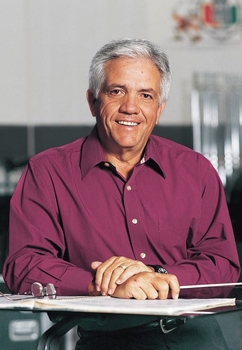Four world premieres highlight Gary Green’s farewell Frost concert

In his final concert at UM’s Frost School of Music, Gary Green led four world premieres, all written for the occasion.
The concluding program of the University of Miami Frost School of Music’s concert season on Sunday afternoon was no ordinary occasion. Gary D. Green, director of the Frost Wind Ensemble for the past 22 years and a powerful advocate for contemporary composers, was giving his valedictory performance.
Many of Green’s colleagues and former students from around the country filled Gusman Concert Hall for “A Joyful Celebration,” a nearly three-hour program featuring the premieres of four new works written to celebrate Green’s important contribution to the school and the wind band repertoire.
In his opening remarks, Frost Dean Shelly Berg said he had begged Green not to retire and praised his commitment to educating and inspiring young musicians. In the course of the afternoon, friends and colleagues related often witty anecdotes about Green’s performing and teaching career. Each of the four composers introduced their new scores.
Green has always roused his student musicians to play new music with enthusiasm and passion and this very special concert found the ensemble excelling in works that embraced widely varied stylistic paths. All four scores were worthy additions to the growing repertoire for wind ensemble. But the two best came from Green’s fellow faculty member Thomas Sleeper and Mason Bates, at age 38 the afternoon’s youngest composer.
Rather than write a work for wind ensemble, Sleeper contributed his Symphony No. 5–Chamber Symphony, the 13-member chamber orchestra composed of both students and faculty. Cast in three movement, the nearly 30- minute score is one of Sleeper’s finest works.
Opening with a dark and pensive Andante espressivo , the music becomes ever more agitated. The Furioso section unleashes timpani at full throttle. A three-part second movement forms the heart of the work. The initial short, neo-Classical melody is tossed between strings, winds and piano. In the central section, an emotional, melodically inspired theme rises through the ensemble.
The Allegro agitato finale finds metallic percussion taking a major role through the charged rhythms and tart harmonics A rapid, hard-hitting conclusion references Stravinsky’s Le Sacre du Printempts, a work Green conducted with the Frost Symphony Orchestra.
Sleeper’s wonderful thematic invention and challenging instrumental writing shines through every page of this fine work. Green led a rhythmically urgent performance with particularly strong contributions from flutist Trudy Kane, saxophonist Dale Underwood, cellist Joy Adams, pianist Lauralie Pow and percussionist Maria Chlebus.
Bates’ Sideman was a showpiece for the talents of Frost percussion professor Svet Stoyanov. Both densely textured and wonderfully entertaining, the score traverses minimalism, big band jazz and New Age pop. Stoyanov dashed between trap set, vibraphone and Bulgarians drum in a demonstration of speed and dexterity. At one point in the nearly 20-minute score, Stoyanov was using five mallets at once. Bates’ melding of solo percussion with brass and wind timbres and the band’s percussion battery was brought off with supple precision.
At age 83, Michael Colgrass was the concert’s senior creative eminence. (Colgrass’s Urban Requiem had been Green’s first commissioned work at UM.) A ruminative clarinet theme opens his Urban Nocturne, played with warmly mellow sonority by Margaret Donaghue-Flavin. In the ensuing set of variation, her agility was given full display, the leaps between registers splendidly controlled. By turns, acerbic, romantic and dance-like, Colgrass’ 20-minute score was consistently ear-catching. The burnished tone of Ashley Garritson’s cello solos and Leefei Chen’s soft harp stood out in a fine ensemble effort
Green has long championed the music of David Maslanka, a composer who has specialized in wind ensemble works. Set in five movements, Maslanka’s Hosannas (A Shout of Praise) was the most conventional band piece on the program. His skill at producing thrilling blocks of ensemble sound and weaving chorale melodies propel the half-hour score. The final movement is a transcription of Maslanka’s choral work A Litany for Courage and the Seasons with a text by poet Richard Beale. Tenor Tony Boutté gave subtle expression to the lyrical paragraphs.
Gary Green has led some of the Frost school’s most adventurous programs. The sheer amount of new music he has premiered has been remarkable. He will be greatly missed and this special program was a well deserved, joyous tribute.
Posted in Performances
One Response to “Four world premieres highlight Gary Green’s farewell Frost concert”
Leave a Comment
Mon Apr 27, 2015
at 1:55 pm
1 Comment






Posted Apr 30, 2015 at 7:21 am by Andrew Kidd
Congratulations Gary. A much deserved retirement. You have touched thousands of young lives with your teaching and conducting craft.
Enjoy your new life.
Andrew Kidd